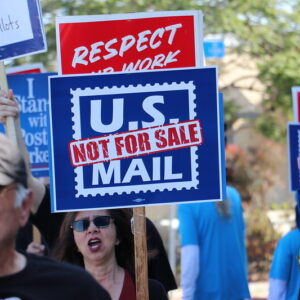November 24, 2015
In Meeting with FTC Staff, Union Voices Skepticism about Essendant as a Substitute for True Competition in the Office-Supply Market
WASHINGTON – On November 18, representatives of the American Postal Workers Union (APWU) met with Federal Trade Commission investigators to present the union’s report “Bad for Business.” The report is an analysis of how the proposed merger of Staples and Office Depot would hurt American businesses if it were approved by federal regulators.
The report examines the impact of the proposed merger of America’s largest and second largest office-supply superstore chains on business-to-business transactions.
The APWU study reveals that a combined Staples and Office Depot would have over $14 billion in annual sales to business customers in North America – nearly 14 times greater than its nearest competitor. Competitors to a combined Staples/Office Depot would be so small and weak that APWU President Mark Dimondstein has described it as “Bambi vs. Godzilla.”
In the meeting, held at the FTC’s Washington offices, the APWU also voiced strenuous objections to relying on office-supply wholesaler Essendant to remedy the harm that would be caused by combining the top two competitors.
Even with the addition of divested Staples corporate contracts, Essendant would not be a significant competitor in the office-supply market, the union said.
A spin-off of corporate contracts could not offer more than a short-lived solution because contracts could easily return to Staples, the APWU pointed out. FTC representatives responded that, as with any FTC-approved settlement, any possible settlement agreement in this case would need to exhibit “simplicity and concreteness.”
APWU representatives also stressed that Essendant was not a fair substitute for businesses looking for nationwide one-stop shopping comparable to what they currently receive from the two large competing retailers.
In addition to its “Bad for Business” report, APWU also released a study in May 2015, “No Sale,” describing why the merger of the giant office-supply chains was bad for consumers.
No Sale identified four specific reasons why the proposed merger of the only two remaining office-supply superstore chains in the U.S. should be blocked, including:
1. Mass market retailers, such as Target and Walmart, are not true competitors with office superstores.
2. Once the office-supply superstore market shrinks to a single company, it will never grow back because the barriers to entry would be too high.
3. Internet retailers are not true competitors in the office-supply market. They can’t compete for business from the more than one in five U.S. households – about 65 million people – who do not have Internet access.
4. Higher prices and reduced choice – the inevitable consequence of a monopoly market – will cause disproportionate harm to communities of color and low-income households.
A decision from the FTC staff is expected on December 8, although another extension is possible. Reviews from regulators in Canada and the European Union will extend into 2016.
The American Postal Workers Union represents 200,000 employees of the United States Postal Service, and is affiliated with the AFL-CIO. For more information on APWU, visit www.apwu.org
# # #


